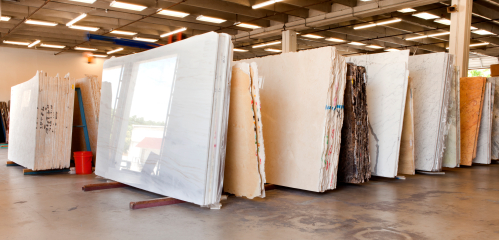 Natural stone finishes add style and elegance to a Chicago kitchen remodel, but not all stones are created equal. And, for that matter, slabs made from the same stone aren't created equal either. Because stones are made in nature, rather than fabricated in a shop, there are no regulations or standards that govern things like thickness, pattern uniformity or the number of pores present.
Natural stone finishes add style and elegance to a Chicago kitchen remodel, but not all stones are created equal. And, for that matter, slabs made from the same stone aren't created equal either. Because stones are made in nature, rather than fabricated in a shop, there are no regulations or standards that govern things like thickness, pattern uniformity or the number of pores present.
7 Questions to Ask When Purchasing Stone For a Chicago Kitchen Remodel
The following questions will help you decide on the best stone product for the application and your household's lifestyle. If you work with a kitchen design and build team, they should to assist you in this department as well.
- How thick is it? There are "traditional" thicknesses for each application in the home. For example, stone slabs used on the countertop are usually 3/4-inches or 1 1/4-inches thick. Edges can be customized to make it appear thicker - a common "trick of the trade." Wall and floor tiles, on the other hand, are usually 3/8-inches thick. Ask how consistent a box of tiles is - the last thing you needs is a box full of tiles in varying thicknesses.
- What finishes are available? You will often have a choice in the way the stone is finished. These finish options include:
--Polished, where the stone has a very smooth, shiny and reflective surface.
--Honed, where the stone is lightly polished, yielding a smooth but more matte finish than its polished counterpart.
--Leather, where the stone is finished using special brushes that texture the stone a bit, yielding a smooth, soft surface that isn't as shiny as honed or polished versions but better displays the stone's natural color. - How porous is it? Pores are the natural holes present in a stone. Just like skin, some stones have smaller pores, some have larger pores, and some have fewer pores than others. The more porous a stone is, the more prone it is to staining and etching down the road. Also, it will need to be sealed more faithfully over time to keep it looking its best.
- Are there fissures present? As you might imagine, fissures are areas where a stone is weaker, often visible in the form of small cracks. They expand and contract over time, and are more vulnerable to impact, meaning your tile or slab could eventually break, chip or crack along these areas. The less fissures, the better.
- Should it be sealed? If you have natural stone tiles or slab, they should be sealed to protect them from staining and etching. The more porous the stone, the more diligently it should be sealed. Grout should also be sealed. Ask to see a sealed version of your preferred stone since sealant does change the aesthetic a bit.
- Will it hold up? Be honest about your family's habits in the kitchen or bath and your realistic maintenance commitment so your designer can help you choose a stone that continue to look amazing ten years down the road.
When you work with Kitchens & Baths Unlimited, we make sure to answer all the important questions without you ever having to ask. Schedule a consultation to begin planning your Chicago kitchen remodel.



